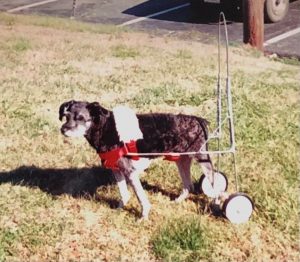17 May The Kirby Cart
We met Kirby, a sweet schnauzer, when he was in the decline of his life. It seemed there was no reasonably affordable nor promising treatment as he was losing control of his hind legs due to spinal cord disease. He was not in pain, but could not walk without assistance. His owners could not afford surgery, nor were they ready to discuss euthanasia.
As a matter of fact, they insisted on boarding him at our clinic for a couple weeks while they travelled out of town to visit family at Christmas. During the time while Kirby was with us, everyone got attached to him. He was the sweetest, most agreeable dog and we could see why it was so difficult for the owners to think about saying goodbye.
Most of us get into this profession out of a love for animals and most of us also have this desire to solve puzzles and do our best to fix everything. I put my MacGyver hat on and decided we probably had everything we needed around the clinic to make a lightweight assistance cart for Kirby.
We used aluminum bar stock we had for making the occasional Thomas splint and shaped it to fit our patient. We used some fleece bedding fabric that we had in the kennel to pad the curved bar that went over his shoulders and the cloth made a sling under his chest. We used two nylon collars (red, since it was Christmas) to go in front of his chest and under his belly. Two kid’s bicycle training wheels may be the only thing we actually had to purchase at our local hardware store.
We fashioned the little cart with duct tape to attach the aluminum pieces to each other. We stitched the fabric pieces to the frame and it fit him and supported his hind end perfectly. We named it the ‘Kirby cart.’ We did all this completely unbeknownst to the owners who returned from their trip to pick up Kirby and were met by him walking out into the lobby with his training wheels. They were overwhelmed and moved to tears.
Though this did not mean Kirby lived indefinitely – we didn’t cure anything – we did buy him a little more time and brightened the spirits of his loving owners.
Kirby’s story is a good reminder. Veterinary Medicine is not only about fees and making money as those of us who have been in private practice awhile are aware. Yes, we need to charge appropriate fees to compensate us for our time and our educational background. We need to be able to pay our indispensable staff who make it possible for us to practice at all. We deal with suffering, sad endings and the frustration of difficult clients. Our ability to have compassion for our patients and their people can bring us joy and brighten a situation for the owners, even if just for a short time.
Kirby in his cart
Written by Mary Chorney Carter, DVM, Fayetteville Animal Clinic



